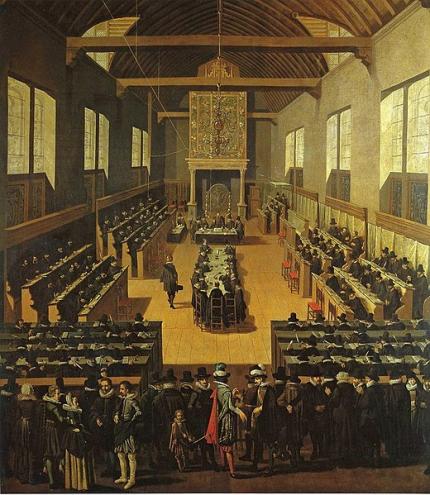Calvin Seminary to Host Commemorative Conference on Synod of Dort

The Synod of Dort. The Arminians are seated at the table in the middle.
Calvin Theological Seminary is bringing in scholars and others for a two-day conference to commemorate the 400th anniversary of the Synod of Dort, which met between 1618-19 in the city of Dordrecht in the Netherlands.
Meeting Sept. 14-15 at the seminary, the Synod of Dort Conference will be geared to the general public and will include visuals, music, panel discussions, and a special exhibit of the Statenbijbel, the official Dutch Bible commissioned by the synod and first published in 1637.
The Synod of Dort met to combat Arminianism, based on the teachings of Jacobus Arminius. These teachings boiled down to five points: Free will or human ability, Conditional election, Universal redemption or general atonement, Resistance to the Holy Spirit, and Falling from grace.
“Ranking with the Presbyterian Westminster Assembly, the Synod of Dort is the most significant church assembly in the Reformed tradition, especially for churches of Dutch Reformed heritage,” writes Don Sinnema, a retired theology professor from Trinity Christian College, in the Christian Courier. He is one of the speakers at the conference.
When the teachings of Jacobus Jacobus Arminius started to spread, the Reformed church in the Netherlands called the synod, drawing delegates from across Europe, to speak out against the Arminian errors.
“Though it was a Dutch national synod, it had a broad international character. . . . Even when denominations of Dutch heritage modernized their church orders, the foundation on which revisions were made still remained the Church Order of Dort. This is clearly the case with the Christian Reformed Church and Reformed Church in America,” writes Sinnema.
The great result of the work of the synod is known as the Canons of Dort. Canon is from a Greek word meaning “rule” or “standard.” The Canons of Dort, which are divided into “Main Points of Doctrine,” provide responses to the Arminian points.
Each of the main points is divided into several articles, positively developing the Reformed teaching on that point. And at the end of each main point is a section called “Rejection of the Errors,” which identifies and responds to the specific Arminian errors.
So in this step-by-step fashion, the Canons of Dort give the Reformed answer to the five points of Arminianism.
The familiar term TULIP came out of this as a teaching tool that scholars began to use in the 1900s to help explain, in shorthand, the five main points of doctrine that came out of the Synod of Dort.
The acronym serves as a mnemonic to help students remember the five points as Total depravity, Unconditional election, Limited atonement, Irresistible grace, and Perseverance (or Preservation) of the saints.
For many Christians today “the teachings of the Canons of Dort seem narrow and irrelevant in a world in which many reject Christ. But is that wise?” writes W. Robert Godfrey, a scholar who will not be a speaker at the conference.
The conference will address a range of questions related to the significance of the Synod of Dort for Reformed Christians today. The gathering will bring together a range of experts to explain in accessible presentations what the Synod of Dort did, why the Synod of Dort was significant at the time, and why this 400th anniversary should be commemorated in churches and communities today, says the conference website.
This conference is open to pastors, faculty/staff, undergraduate students, graduate students, and general community members. It runs from the afternoon of Friday, Sept. 14, through the morning of Saturday, Sept. 15, at Calvin Theological Seminary,
Cosponsored by the H. Henry Meeter Center for Calvin Studies, Calvin Theological Seminary, Western Theological Seminary, the Christian Reformed Church in North America, and the Calvin College Seminars in Christian Scholarship, the conference will address how the work of the Synod of Dort encompassed a broad range of issues, including catechisms, Bible translation, theological training, and more.
Click here for a list of speakers. Additional participants will be Paul Fields, curator of the Meeter Center at Calvin College, and three panelists for the final session: Karin Maag, director of the Meeter Center; Kathy Smith, associate director and program manager for grants programs in the Calvin Institute of Christian Worship; and Matthew van Maastricht, pastor of the Altamont Reformed Church (RCA) in Altamont, N.Y.
Click here to register for the conference.


